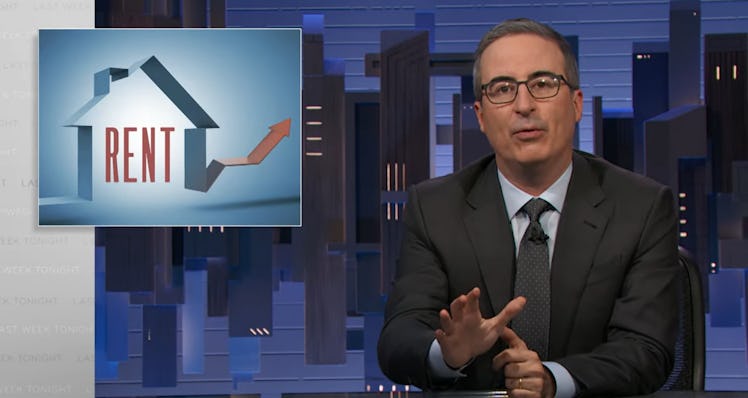Watch John Oliver Tear Apart the Ridiculousness Of The Rental Housing Market
"That is the core issue with rental housing in this country, though: People who think that investments deserve more respect than basic human needs.”

John Oliver recently tackled the meteoric rise in nationwide rents — rent that has jumped between 14 and 40 percent nationwide last year per one study — on his HBO show Last Week Tonight yesterday. In the 22-minute clip, the comedian brilliantly broke down why and how renters, a group that represents 35% of American households, are getting seriously screwed over.
In the segment, John notes that for the more than a third of Americans rent their home, prices are “skyrocketing.” Oliver referenced a Redfin study that shows that the median monthly rent has surpassed $2,000, which is a 15 percent increase over the last year, well above inflation rates. But that’s the minimum. In some other cities, like Seattle, rent has risen on average 30 percent. In Austin, rent has increased on average by 50 percent.
Trying to find anywhere to rent that’s within budget is increasingly impossible. Landlords are pricing people out of the rental market and rental prices are growing faster than wages, the segment explained, citing a Zillow report. This isn’t a new phenomenon — but it’s getting worse.
Oliver also addressed a 2021 study from the National Low Income Housing Coalition that shows “in no … county in the U.S. can a worker earning the … minimum wage afford a modest two-bedroom rental home.” (This is no surprise.)
Even though the number of rental units available across the country has grown, available units are already priced above what most can afford. There are millions fewer affordable units on the market than there were a decade ago. So there while there are more rental units on the market right now than there were ten years ago, fewer of them are affordable, and landlords get to call the shots.
And in nearly every state, they do. Oliver points out that only two states have a “rent stabilization” protection which means on some older properties, landlords can only raise the rent a certain percentage each year. Often, this is tied to inflation. More than 30 states have passed laws banning rent stabilization.
Olivier also criticized the underfunded assistance programs such as housing vouchers which, as he points out, isn’t something landlords have to honor. He goes on to point out how the power imbalance between landlords and renters, along with the rising costs, confusing legal proceedings, and everything stacked up against tenants leads to evictions.
"That is the core issue with rental housing in this country, though: People who think that investments deserve more respect than basic human needs, and then set up a system designed to ensure that some people just spiral downwards," Oliver said.
"They can't move somewhere cheaper if nowhere cheaper exists; they can't apply for federal assistance if there's nowhere near enough; they can't even use that assistance if no one accepts it, and they can't take their landlord to court if the court system is skewed against them, and they can't depend on rental housing ever again if they're evicted even just once. It's a complete sh*tshow."
Oliver ends the segment with a few points on what could be done to address the rent issues including passing rent stabilization laws, passing laws that prohibit discrimination against housing vouchers, sealing eviction records, and giving people a right to have legal counsel in eviction cases.
“All we really need to do is fundamentally change our mindset away from simply hoping that we can tinker around the edges of housing policy and the private market will sort the rest of this sh*t out,” Oliver said. “Instead, we need to agree housing is a human right.”